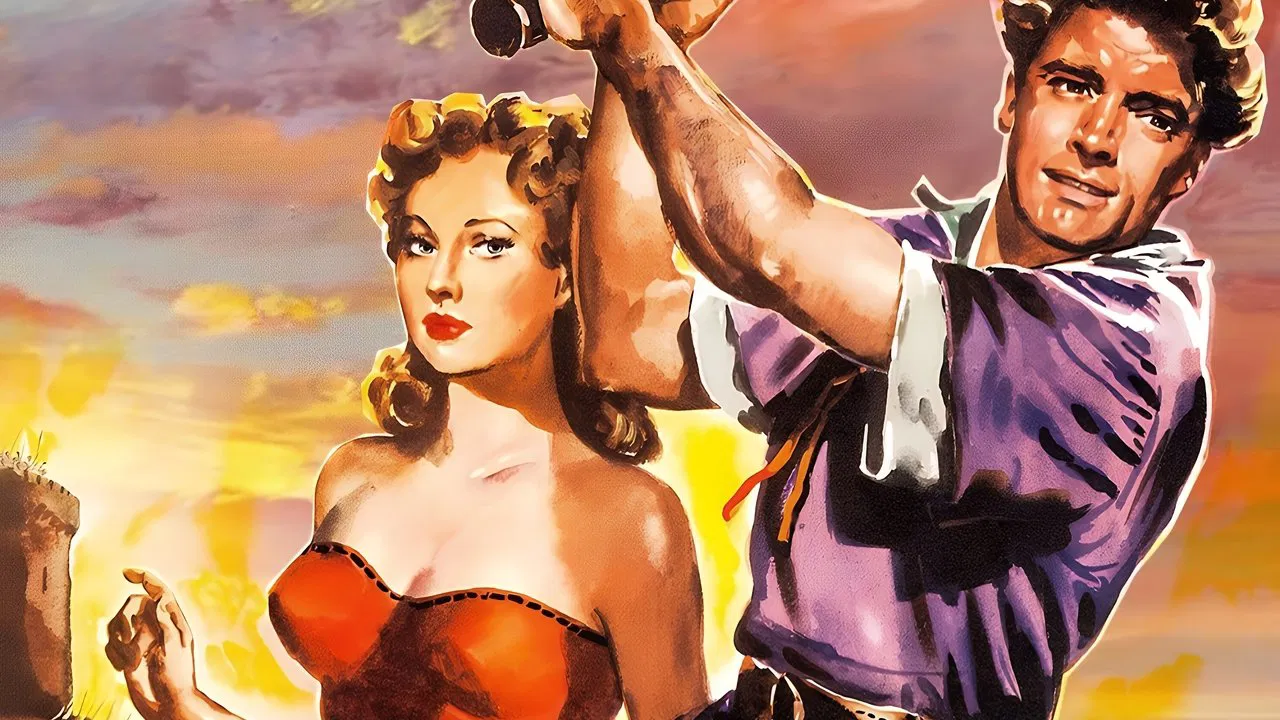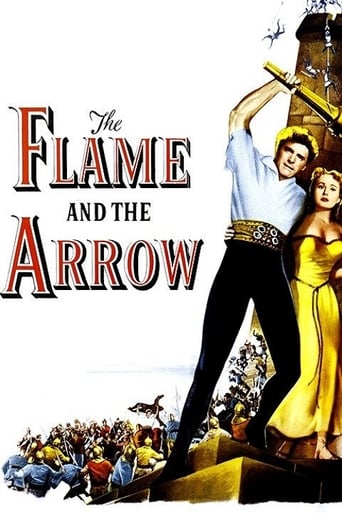Colibel
Terrible acting, screenplay and direction.
Melanie Bouvet
The movie's not perfect, but it sticks the landing of its message. It was engaging - thrilling at times - and I personally thought it was a great time.
Gary
The movie's not perfect, but it sticks the landing of its message. It was engaging - thrilling at times - and I personally thought it was a great time.
grantss
Mostly quite silly and hammy. There's only one good reason to see this...Set in medieval times, Lombardy in northern Italy is under the rule of the Hessians. A man, Dardo Bartoli, emerges to defy the rulers.The movie is essentially Robin Hood set in Italy, and not a good adaptation either. Quite unoriginal and predictable central plot and quite silly sub-plots.Performance are quite hammy. You wouldn't know Burt Lancaster would go on to become one of the biggest actors in the world he is so unconvincing. Fortunately, there is one performer that stands out: Virginia Mayo. She is stunningly beautiful and puts in the best performance of the movie. She's the only reason to watch this movie.
zardoz-13
Burt Lancaster and his real-life trapeze partner Nick Cravat perform some pretty astonishing acrobatic stunts in "Out of the Past" director Jacques Tourneur's nimble Technicolor swashbuckler "The Flame and the Arrow" as they tangle with the villains and rescue gorgeous damsel-in-distress Virginia Mayo. Two-time Oscar winning scenarist Waldo Salt, who won his statuettes for "Midnight Cowboy" and "Coming Home," penned the screenplay for this frisky "Robin Hood" style adventure yarn that rarely takes itself seriously. This colorful twelfth-century tale takes place in medieval Italy in a province known as Lombardy. Dardo Bartoli (Burt Lancaster of "The Killers") is an agile huntsman whose unfaithful wife has abandoned him for the arms of Hessian nobleman Count 'The Hawk' Ullrich (Frank Allenby), but Dardo knows that he is better off without the dame. Indeed, he enjoys the companionship of his son Rudi (Gordon Gebert of "The Narrow Margin"), and he refuses to become involved with the local rebels who want to oust 'The Hawk.' Dardo's non-participatory attitude changes after 'The Hawk' abducts his son at the request of Dardo's wayward wife, Francesca (Lynn Baggett of "D.O.A.") wants her son to enjoy the privileges of a nobleman. Ernst Haller's cinematography is a bonus that got an Oscar nomination along with Max Steiner's orchestral score. Although the plot is predictable from fade-in to fade-out, Lancaster displays gusto galore as the heroic mountaineer who is adept with a bow and arrow. If you're a Burt Lancaster fan, this Warner Brothers costumer should keep you enthralled.
funkyfry
"The Flame and the Arrow" is old fashioned entertainment, and what's more the product of great professionalism and talent. At first the story seems very much a clone of "Robin Hood", with Burt Lancaster's athleticism on display as he portrays a mountain man engaged in a rebellion against the Hessians when they kidnap his boy and try to raise him as a gentleman. First major difference, is that this character of Dardo is not such an idealist as Robin Hood -- he says he only cares about rescuing the boy and not about rebelling per se. His attitude seems to be that as long as the imperialists stay in the city and leave him to the mountains, he doesn't care what they think they rule. In that sense of course he's very different from Robin Hood, who only appears to be a "peasant" but is truly a nobleman and bound to be restored to his throne by the end. This film story is much more democratic in its heart. Also there is the character of Marchese Alessandro, brilliantly performed by Robert Douglas, who battles Dardo in a confrontation that reminds one of Little John and Robin Hood's fight on the log, but this Marchese isn't such a loyal companion as one would hope. There's a bit less romanticism in this story as well, in other words.The technical aspects of this film are really excellent, Tourneur's direction is perfectly balanced and Ernest Haller's cinematography is the excellent kind of color photography you used to see back at this time, so often muted in poor transfers but here on a nice DVD package you can see all the use of shadows and bright foregrounds, and his use of all the flame and fire imagery is very effective. I'd have to see it again to get a better sense, but this film reminds me of the same type of color scheme from Tourneur's "Canyon Passage." The leading lady from one of Tourneur's best films, "Great Day in the Morning", Virginia Mayo, is just incredibly beautiful in her riding pants and her dainty court finery. I've always felt that Mayo held a bit too much back, that she came off as sort of overly dignified on screen. "Great Day" is really no exception (though she does wear pants in that one too), but in "The Flame and the Arrow" she seems downright feisty at some moments. The scenes where he has her literally chained up are hilarious and very sexy.Lancaster himself reminded me in this movie of why he was a star -- he has a ton of charisma, and his physical prowess puts Errol Flynn to shame and reminds one more of Douglas Fairbanks Sr. I liked how the acrobatic ability of Dardo and his mute friend Piccolo (Nick Cravat) was incorporated into their ruse towards the end. There's an almost dizzying visual dexterity here between some of Tourneur's great shots and the excellent stunt work on display here, and as if that wasn't enough the whole thing is offset by self conscious humor. For instance as they are breaking into the castle, they seem to use this large pole for just about everything -- first in the ruse, then in getting up on the roof to let their friends through the gate, then to walk across a chasm, and finally just when you're thinking "geez, it's getting ridiculous how useful this stick is", Dardo tries to break open the prison doors with it and it snaps in half. Piccolo just smiles and him and holds out the keys. The movie is full of exciting and fun moments like this.Great fun that's suitable for even the smallest children or the oldest and most cynical grownups.
Robert J. Maxwell
Written and directed by two professionals -- Waldo Salt and Jacques Tourneur -- this movie about Hessians occupying and exploiting one of the city-states of northern Italy moves along at a pretty good clip. There's not very much that's original in the plot. The evil Hessian King Ulrich is known as "The Hawk." He has a saucy daughter, Anne (Virginia Mayo) who is kidnapped from her father's castle by the brigand Dardo (Burt Lancaster) and his merry men. The merry men dress like slobs and they eat and drink with gusto, while the castle Hessians mope around with icy and disdainful expressions. There's wise, old Papa Pietro (Francis Pierlot) and the scolding woman who seems to lead the townspeople, Nonna Bartoli (Aline McMahon). It's a little known fact that her family, the Bartolis, went on to found the greatest olive oil empire the world has ever known. The reason that fact is so little known is that I just made it up. There's a greedy traitor (Robert Douglas) who rats on Dardo's plan to put the snatch on Dardo's own son in order to raise him as a MAN, not just some effete snob mincing around inside the stone walls. Lots of royal intrigue. (Does any of this sound familiar yet?) There's a climactic sword fight between Lancaster and Douglas, which Douglas loses, just as he lost the climactic sword fight with Errol Flynn in "The Adventures of Don Juan" a few years earlier. In the final brawl, men fight with furniture. They dump over candelabras or torchieres. There is a comic figure (Norman Lloyd), a poetic type, who dances around bopping enemies on the head from behind. Virginia Mayo, who has fallen in love with Dardo and is sympathetic to his cause, swoons over him in the background. Tourneur missed one cliché, though -- the shadows of fiercely dueling men on the castle walls.The most striking thing about the film, at least for me, was Burt Lancaster as action/adventure hero in a period flick. Previously, he'd passed for a rather ordinary, sometimes kind of dumb, fatalistic protagonist of films noir -- "I Walk Alone," "The Killers", "Criss Cross." And then -- whammo -- he's out of his suits and ties and into the colorful garb of 13th-century Italy, or what was construed as such by Hollywood in the early 1950s. I doubt that the Italians had skin-tight Spandex leotards. And -- not only that -- but suddenly Lancaster is doing all the acrobatic stunts that he and his partner, Nick Cravat, had done ten years earlier, as well as during their stint in the Army's Special Services road shows. And he's a big guy for an acrobat, with a lot of weight to heft around. At one point he holds his body horizontally out from a pole, a difficult stunt that gymnasts call "the flag" -- and then he removes one of the hands propping him up.I think his later "acrobatic" films were better, especially "The Crimson Pirate", which had a far better, more amusing script, and "His Majesty O'Keefe," which provoked some serious sub rosa thought, in people given to serious thought. He kept fit for the rest of his life, even doing some clearly dangerous stunt work as late as "The Professionals" in 1968. Like some other tall, sinewy actors -- Clint Eastwood, for instance -- Lancaster seemed to have such delicate hands and fingers. What one character says of Leopold Bloom in Joyce's "Ulysses" could as easily be said about Lancaster -- "He'd have a soft hand under a hen." If this film gave a boost to his career, and it probably did, he certainly hit the ground running.Bonus points to whoever dreamed up Dardo's line, "All wives leave their husbands sooner or later, but they don't always take their bodies with them."

